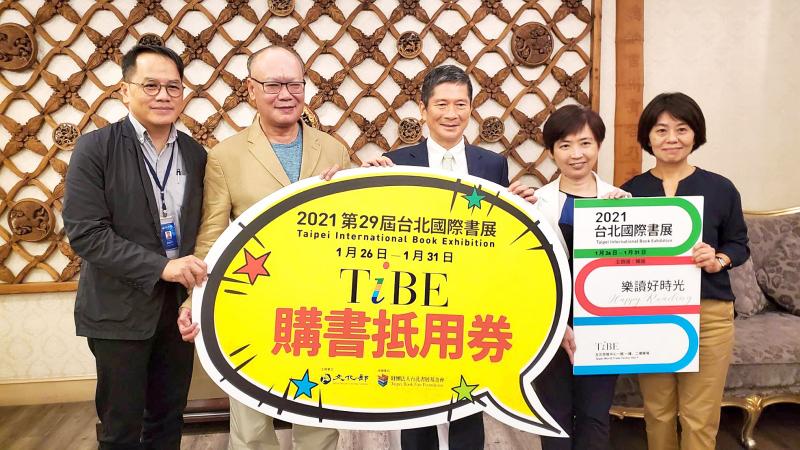The Ministry of Culture yesterday said it would issue vouchers for book purchases at next year’s Taipei International Book Exhibition (TIBE).
The annual exhibition is sponsored by the ministry and organized by the Taipei Book Fair Foundation.
For the first time, the ministry is to release a limited number of NT$100 vouchers for people to spend at the exhibition, Minister of Culture Lee Yung-te (李永得) said.

Photo: Ling Mei-hsueh, Taipei Times
A total of 200,000 sets of vouchers would be given to visitors — including those who purchase tickets, as well as those who are eligible to enter for free — upon entering the venue, he said.
The scheme aims to encourage people to purchase books and support the publishing industry, Lee said, calling for “retaliatory” participation in next year’s event after this year’s physical event was canceled due to the COVID-19 pandemic.
On Jan. 30, five days before the exhibition was to open, the ministry announced that it had made a joint decision with the foundation to postpone the event until May.
On March 18, the organizers announced that this year’s physical event was canceled altogether.
On May 15, they launched an online version at www.tibeonline.tw.
Next year’s exhibition would be its 29th edition and is to be held at the Taipei World Trade Center from Jan. 26 to 31, with the theme of “Happy Reading,” the ministry said.
The exhibition would feature an online edition that would “capture the essence of the physical book fair,” it said, adding that the virtual event would allow people who cannot attend the fair in person to “experience its charm.”
The ministry would follow the Central Epidemic Command Center’s guidelines and revise its disease prevention measures as needed to provide a safe environment, it said.
As part of an effort to upgrade the services at the exhibition, the ministry is to increase the Internet bandwidth at the venue to help exhibitors improve their livestreams, it said.
The guest of honor at the book fair is the highlight of each year, foundation chairman Robert Lin (林訓民) said, adding that South Korea is to be the guest of honor for the second consecutive event.
It would be South Korea’s third time in the role, having previously been invited as guest of honor in 2005 and this year’s online exhibition, he said.
Lin said that he hopes that the international COVID-19 situation subsides, so that exhibitors from around the world can travel to Taiwan for the exhibition.
This year’s exhibition, whose theme was “New Horizons of Reading,” was one of the first large-scale events in Taiwan to be affected by the pandemic.
The Web site of the online exhibition, which ran from May 15 to June 30, as well as TIBE’s social media pages and video channels combined garnered more than 500,000 clicks, the ministry said.
In light of the pandemic’s effects on the arts and culture industries, the ministry this year launched an “Arts FUN Go” program to give NT$600 vouchers to about 2 million people to encourage spending in related businesses.
On Monday last week, it announced an expansion of the “Arts FUN Go” program to benefit people aged 65 or older, those aged 18 or younger, and people with disabilities, with an additional 600,000 sets of vouchers to be released.

The Grand Hotel Taipei on Saturday confirmed that its information system had been illegally accessed and expressed its deepest apologies for the concern it has caused its customers, adding that the issue is being investigated by the Ministry of Justice Investigation Bureau. The hotel said that on Tuesday last week, it had discovered an external illegal intrusion into its information system. An initial digital forensic investigation confirmed that parts of the system had been accessed, it said, adding that the possibility that some customer data were stolen and leaked could not be ruled out. The actual scope and content of the affected data

DO THEY BITE IT? Cats have better memories than people might think, but their motivation is based entirely around the chance of getting fed Cats can remember the identity of the people who fed them the day before, Taipei-based veterinarians said on Friday, debunking a popular myth that cats have a short memory. If a stray does not recognize the person who fed them the previous day, it is likely because they are not carrying food and the cat has no reason to recognize them, said Wu Chou Animal Hospital head Chen Chen-huan (陳震寰). “When cats come to a human bearing food, it is coming for the food, not the person,” he said. “The food is the key.” Since the cat’s attention is on the food, it

A New York-based NGO has launched a global initiative to rename the nation’s overseas missions, most of which operate under the name "Taipei," to "Taiwan Representative Office (TRO)," according to a news release. Ming Chiang (江明信), CEO of Hello Taiwan, announced the campaign at a news conference in Berlin on Monday, coinciding with the World Forum held from Monday through Wednesday, the institution stated in the release. Speaking at the event, Democratic Progressive Party Legislator Huang Jie (黃捷) said she believed this renaming campaign would enable the international community to see Taiwan

TOO DANGEROUS: The families agreed to suspend crewed recovery efforts that could put rescuers in danger from volcanic gases and unstable terrain The bodies of two Taiwanese tourists and a Japanese pilot have been located inside a volcanic crater, Japanese authorities said yesterday, nearly a month after a sightseeing helicopter crashed during a flight over southwestern Japan. Drone footage taken at the site showed three bodies near the wreckage of the aircraft inside a crater on Mount Aso in Kumamoto Prefecture, police and fire officials said. The helicopter went missing on Jan. 20 and was later found on a steep slope inside the Nakadake No. 1 Crater, about 50m below the rim. Authorities said that conditions at the site made survival highly unlikely, and ruled